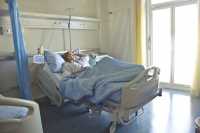
09 Jul Dying Unconscious Patients May Still Be Able to Hear
MedicalResearch.com Interview with:

Dr. Blundon
Elizabeth Blundon PhD
Department of Psychology
University of British Columbia – Vancouver
MedicalResearch.com: What is the background for this study?
Response: Many healthcare workers have noticed that dying patients appear to be comforted by the words of their loved ones, even when patients appear to be unconscious and are no longer able to communicate. There is a persistent belief, therefore, that hearing may persist into the last hours of someone’s life. Our study attempts to detect evidence of hearing among a small group of unresponsive hospice patients at the end of life.
To do this, we compared the brain activity of young, healthy control participants, with the brain activity of hospice patients, both when the patients were awake and responsive, and again when they became unresponsive. The brain activity we measured was in response to a complex series of tone-patterns, where participants were asked to identify by pressing a button (control participants) or by counting (hospice patients) every time they heard a tone-pattern that was different from the rest of the series.
MedicalResearch.com: What are the main findings?
Response: We found that many of the hospice patients generated brain activity that was highly similar to that of controls, even when the patients appeared to be unconscious. This suggests that the brain can still process sound even during the last hours of life.
MedicalResearch.com: What should readers take away from your report?
Response: Loved ones should continue to be encouraged to communicate with dying patients for as long as possible, even when the patients appear to be unconscious. This can include speaking to them at the bedside or on the phone, or even playing them some of their favourite music.
MedicalResearch.com: What recommendations do you have for future research as a result of this work?
Response: We don’t yet know if unresponsive dying patients are aware of what they’re hearing, or if they can understand their loved ones speaking to them, or if they feel touch. The answers to these questions could offer peace of mind to those providing support and comfort during the last hours of someone’s life.
Any disclosures?
Dr. Gallagher was a physician at the hospice from which we collected our data throughout the course of the study.
Citation:
Elizabeth G. Blundon, Romayne E. Gallagher, Lawrence M. Ward.Electrophysiological evidence of preserved hearing at the end of life. Scientific Reports, 2020; 10 (1) DOI: 10.1038/s41598-020-67234-9
[subscribe]
[last-modified]
The information on MedicalResearch.com is provided for educational purposes only, and is in no way intended to diagnose, cure, or treat any medical or other condition. Always seek the advice of your physician or other qualified health and ask your doctor any questions you may have regarding a medical condition. In addition to all other limitations and disclaimers in this agreement, service provider and its third party providers disclaim any liability or loss in connection with the content provided on this website.
Last Updated on July 9, 2020 by Marie Benz MD FAAD
